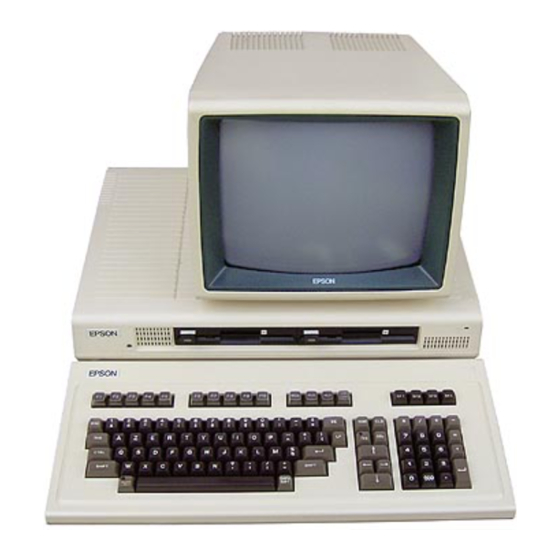Epson SND-3080CF Manuale operativo - Pagina 21
Sfoglia online o scarica il pdf Manuale operativo per Desktop Epson SND-3080CF. Epson SND-3080CF 45. Epson operations manual computer qx-10

A bit is a unit of computer information. Physically, it consists
of a microscopic electrical switch that can be closed or open,
representing the alternatives of yes or no, on or off, and so forth.
The word
is derived from the words binary
bit
need to wrestle with complicated computer theory to fully com-
prehend bits, but for our purposes all we need to know is that
groups of bits are called bytes. A byte is a group of 8 bits that func-
tions as a character or symbol that the computer can understand.
The 780C microprocessor is an 8-bit microprocessor.
The QX-10's microprocessor can combine bytes in a multitude
of ways. As an example, one byte can have a numerical value of
0 to 255. Suppose you tell the computer to store one byte that has
the value of the number 44 and another byte that has the value
of the number 56. If you then command the computer to add these
two bytes, it retrieves them from their respective storage slots and
creates a new byte with the value of 100, which it then stores in
memory.
It's through this sort of mathematical operation that the QX-10
gains its computing power. All of the various combinations of
bytes, and all of the combinations of bit patterns within each byte,
instruct the computer to perform deeds ranging from simple math
to reformatting blocks of text in a document.
QX-10 Memory
Unlike the human brain, the QX-10 has a limit to the amount
of information it can store in memory. On the other hand, peo-
ple sometimes have trouble recalling facts, but the QX-10's stored
data is always accessible on demand. You'll remember that infor-
mation is stored as bytes. A thousand and twenty-four (1024) bytes
is called a kilobyte. Your QX-10 has 256 kilobytes (256K).
Note: Although kilo means exactly 1000, it is used for convenience
to denote 1024 bytes; for instance, 256K is really 262, 144
bytes. The number 1024 is used since it is the closest number
to 1000 which is an exact power of 2 (1024 is 2 raised to the
10th power). Computers like numbers divisible by 2.
18
You would
digit.
